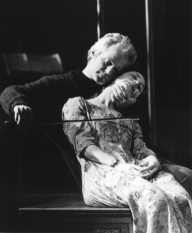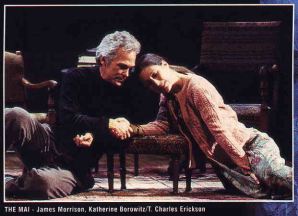
THE MAI is set in the Midlands, Ireland, from the summer of 1979 to the present. It is a tale of four generations of Irish women -- of their lives woven mosaic of history and fantasy which often seems to lead to unexpected disappointment.
Heading this matriarchy is Grandmother Fraochlan, an opium-smoking fountainhead who carts around a ten-foot oar with her at all times as a reminder of her dear husband. She brags endlessly about her brief but passionate marriage to the "nine-fingered fisherman," now deceased some sixty years.
Of the grandmother's seven children, only spinsters Agnes and Julia appear, spouting dubious and conflicting wisdom -- meddling in a way that only spinster ladies can. A third child, Ellen, is now departed, but had three daughters -- one of whom is the Mai (pronounced "May"). The other pair, Beck and Connie, also show up, bringing various degrees of comfort. The Mai, in turn, has four children of her own. The single daughter, Millie, acts as our narrator -- providing insight into the local Irish legends and offering her sense of the family as it unravels.
The single male in this play is the Mai's husband, Robert, a handsome philanderer whose apparent sole virtue is that he plays the cello.
The Mai is a school administrator who has had to fight hard and nobly to hold onto her home and support her children with very little help from their absentee father, represented by his cello in one corner. The Mai desperately loves Robert and has scrimped and suffered to build a home for him well above her means. For five years, alone, she dreams of her phantom lover.
As the play opens, a recently returned Robert sits playing his cello until the Mai enters the room. Robert sweeps her up in his arms and the lovers perform a ballet of passionate gestures. He presents the Mai with a few minor gifts including a perfume atomizer which he squirts at her in a manner suggesting what he has come home for. The Mai welcomes him with open arms. This spell is broken, however, as their dark-eyed sharp-tongued daughter, Millie, steps forward and confides to the audience that this marriage is a sham.
This sham and it's unmasking becomes the focus of interest in a parade of the family members who comment and criticize. The play descends into internecine warfare -- between husband and wife and between generations. During one knockabout fight, Robert yells at the Mai, "My personal life is my own business!"
The precursor to the Mai's overdue realization begins as the couple gets ready for a big local ball. The Mai is stunning in a black gown that fits like skin and makes it perfectly clear Robert did not leave her for a woman better looking. Robert is handsome in a dinner jacket. They go off together as if they might be happily reunited. Grandma, with Beck, stay home and indulge in a little opium-smoking as the elder reminisces about her life in more exotic climes where she picked up her taste for this drug and her nine-fingered fisherman. But fairly soon, the Mai returns home alone, devastated and finally furious.
Robert has abandoned her in the middle of the dance floor, in the middle of a dance, to waltz off with his local mistress! And when the Mai asked for the car keys to drive home, he refused her, saying he had to take the other woman home. She gets the keys away from him, and Robert's mistress drops him off at home later.

When he shows up, the Mai gives him a violent, four-letter-word tongue-lashing before her assembled family. The fight is notable for its verbal rather than its physical violence, but still leaves the Mai on the floor, destroyed. Synopsized from reviews by Stuart Duncan for the Princeton Packet, William McCleery for Town Topics, Ted Otten for The Times, and Robin Whittemore.
"Carr weaves a grim tapestry of home life. She raises the pettiness of self-inflicted tragedies to the mythic arena of the storyteller. In this U.S. debut, Carr receives a carefully crafted production under the direction of Emily Mann. The exceptional cast brings to life these tempestuous, irritable, destructive, yet often seductive characters." Robin Whittemore

